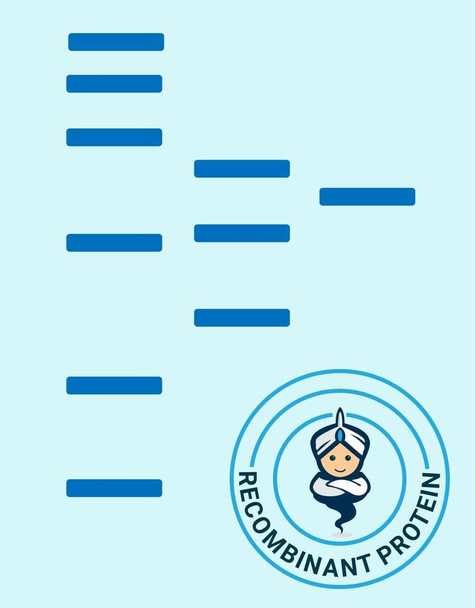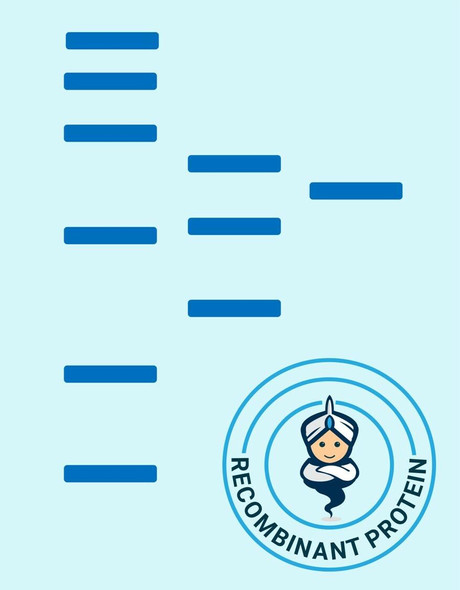Description
| Product Name: | Human S100G Recombinant Protein |
| Product Code: | RPPB4576 |
| Size: | 10µg |
| Species: | Human |
| Target: | S100G |
| Synonyms: | Protein S100-G, Calbindin-D9k, S100 calcium-binding protein G, Vitamin D-dependent calcium-binding protein intestinal, CABP, S100G, CABP9K, CALB3, S100D, CABP1, MGC138379. |
| Source: | Escherichia Coli |
| Formulation: | S100G was filtered (0.4 �m) and lyophilized in 0.5 mg/ml in 20mM Tris and 50mM NaCl, pH 7.5. |
| Solubility: | It is recommended to add deionized water to prepare a working stock solution of approximately 0.5 mg/ml and let the lyophilized pellet dissolve completely. Product is not sterile! Please filter the product by an appropriate sterile filter before using it in the cell culture. |
| Stability: | Store lyophilized protein at -20°C. Aliquot the product after reconstitution to avoid repeated freezing/thawing cycles. Reconstituted protein can be stored at 4°C for a limited period of time; it does not show any change after two weeks at 4°C. |
| Amino Acid Sequence: | MKHHHHHHAS TKKSPEELKRS TKKSPEELKR IFEKYAAKEG DPDQLSKDEL KLLIQAEFPS LLKGPNTLDD LFQELDKNGD GEVSFEEFQV LVKKISQ |
S100G (calbindin D9K) is a vitamin D-dependent calcium-binding protein. S100G, which is a cytosolic protein, is a member of a family of calcium-binding proteins that includes calmodulin, parvalbumin, troponin C, and S100 protein. In the intestine, S100G is vitamin D-dependent and its expression correlates with calcium transport activity. S100G may increase Ca2+ absorption by buffering Ca2+ in the cytoplasm and increase ATP-dependent Ca2+ transport in duodenal basolateral membrane vesicles.
The Recombinant Human S100G produced in E.coli has a molecular mass of 10.04kDa containing�87 amino acid residues of the human S100G and fused to a�9 a.a. His tag at N-terminus.
| UniProt Protein Function: | S100G: calbindin D9K, a vitamin D-dependent calcium-binding protein. This cytosolic protein belongs to a family of calcium-binding proteins that includes calmodulin, parvalbumin, troponin C, and S100 protein. In the intestine, the protein is vitamin D-dependent and its expression correlates with calcium transport activity. The protein may increase Ca2+ absorption by buffering Ca2+ in the cytoplasm and increase ATP-dependent Ca2+ transport in duodenal basolateral membrane vesicles. [provided by RefSeq, Jul 2008] |
| UniProt Protein Details: | Chromosomal Location of Human Ortholog: Xp22.2 |
| NCBI Summary: | This gene encodes calbindin D9K, a vitamin D-dependent calcium-binding protein. This cytosolic protein belongs to a family of calcium-binding proteins that includes calmodulin, parvalbumin, troponin C, and S100 protein. In the intestine, the protein is vitamin D-dependent and its expression correlates with calcium transport activity. The protein may increase Ca2+ absorption by buffering Ca2+ in the cytoplasm and increase ATP-dependent Ca2+ transport in duodenal basolateral membrane vesicles. [provided by RefSeq, Jul 2008] |
| UniProt Code: | P29377 |
| NCBI GenInfo Identifier: | 115387 |
| NCBI Gene ID: | 795 |
| NCBI Accession: | P29377.2 |
| UniProt Secondary Accession: | P29377,Q5JS49, |
| UniProt Related Accession: | P29377 |
| Molecular Weight: | 9kDa |
| NCBI Full Name: | Protein S100-G |
| NCBI Synonym Full Names: | S100 calcium binding protein G |
| NCBI Official Symbol: | S100G�� |
| NCBI Official Synonym Symbols: | CABP; CABP1; CALB3; CABP9K�� |
| NCBI Protein Information: | protein S100-G |
| UniProt Protein Name: | Protein S100-G |
| UniProt Synonym Protein Names: | Calbindin-D9k; S100 calcium-binding protein G; Vitamin D-dependent calcium-binding protein, intestinal; CABP |
| Protein Family: | Protein |
| UniProt Gene Name: | S100G�� |






